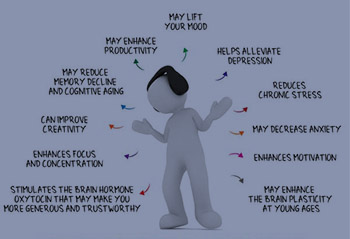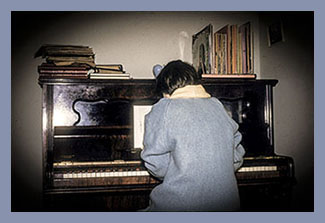
Like us on Follow Us on
Follow Us on  Caregiver Blog
Caregiver Blog![]()
Music & Dementia
“Music and songs bear witness to our lives, connecting us to our inner world
and giving voice to our experiences.”.
For people with memory loss, music and songs have a special significance. As the long term memory is activated it restores a sense of ‘remembered self’. Music creates relaxation, a return to fond memories and feelings of calm and security. Music reorients the person and distracts them from the stresses of life. It may help to lift a person out of depression.
Music has power—especially for individuals with Alzheimer’s disease and related dementias. And it can spark compelling outcomes even in the very late stages of the disease. When used appropriately, music can shift mood, manage stress-induced agitation, stimulate positive interactions, facilitate cognitive function, and coordinate motor movements.
This happens because rhythmic and other well-rehearsed responses require little to no cognitive or mental processing. They are influenced by the motor center of the brain that responds directly to auditory rhythmic cues. A person’s ability to engage in music, particularly rhythm playing and singing, remains intact late into the disease process because, again, these activities do not mandate cognitive functioning for success.
'How-to' of Music Therapy
Early stage -
Early and middle stages -
Middle stage -
Late stage -
From Our Personal Experiences
"I grew up in a musical family. My mother played piano, My father was a jazz pianist and my brother is still a professional touring musician, composer and teacher. In fact all my brothers and sisters including me learned to play several instruments and have many fond music related memories throughout my life.
Once we had placed my mother into the nursing home, I also recall many occassions where my father would go in and play old big band and dixieland Jazz music on the piano. I recall watching with the nursing staff how my mother and the residents would attentively listen, clap, sing or even dance with each other and the nurses as he played. It was at times like they had re-visited a period of their lives at a dance or concert".
My mother playing the piano at an earlier time
Here are a few tips on how to use music at home with your friend or relative.
- Relax together - Music can promote relaxation. There are many different kinds of relaxation music such as nature CDs or classical music compilations of slow and regular movements. Music that is familiar to your friend or relative may often be most effective.
- Listen together - Find time to sit down and listen together. It doesn’t have to be a long session. Music becomes a vehicle for communication and provides opportunities for sharing and relaxing. Gentle massage of hands, shoulders or feet can become part of a regular ritual. Ask a friend, family member or volunteer to help out if you are too busy.
- Sing together - Use a sing-along CD or DVD or sing without recorded music. Pick favorite songs to sing together. Sing while assisting your friend or relative in the shower and during other everyday tasks.
- Move and dance together - Try moving to music – position yourself in front of the person, hold hands and sway from side to side. Dancing together is good, especially if your friend or relative used to dance in their youth. You don’t have to be an expert. Just try moving together while holding hands, or try a traditional ballroom position.
- Invite friends to visit and perform live - Listen to other people sing or play instruments, particularly children. This is a wonderful activity that your friend or relative with dementia will enjoy.
- Get the kitchen band working - Bang with a wooden spoon on a pot in time to some rhythmic music. Invest in a small hand drum, a set of maracas or sleigh bells from your local music shop to add interest. If you feel unsure about playing percussion instruments, ask a primary school child to show you what fun it can be.
- Attend concerts - If appropriate, try attending concerts if there is a familiar program that your friend or family member will enjoy. Contact your local community center to find out what’s on.
OUR STORY
A Family Reflection And A Promise Kept
THE CAREGIVER ROLE
What is a Caregiver
The Caregiver Defined
Who Do Caregivers Care For
Accepting the Reality of Dementia
6 Steps to Successful Caregiving
Caregiver's Are Not Alone
Asking For & Getting Help
The Caregiver Code
Rights of a Caregiver
General Suggestions
Unmet Needs Of A Caregiver
Caregiver And Work
Feelings And Caregiver Stress
Questions & Answers
Notable People
STRESS, COPING & FEELINGS
The Caregiver Code
Rights of The Caregiver
Coping With Stress
Feelings And Caregiver Stress
Stages Of Alzheimer's
Helping Children Understand
Caregiver Burnout
Protecting Yourself From Burnout
Making Time For Reflection
Moving On
How is Competency Defined?
Power of Attorney
What is an Advanced Directive?
Do I Really Need a Will or a Trust?
COMMUNICATION
Importance of Communication
Communicating With Someone Who Has Alzheimer's
Your Approach Sets The Tone
Think Before You Speak
Doing Tasks Together
Having Trouble Being Understood
Keeping a Dementia Journal
Making Caregiving Easier - Caregiver Notebook
Things NOT To Do
When It Just Fails
ALZHEIMER'S BASICS
What is Alzheimer's
Why is Alzheimer's Different
Stages of Alzheimers
Can Alzheimers be Inherited
Statistics
The Mortality Question
TIPS AND ISSUES
New To Family Caregiving?
Tips For Dealing with Aggression
Places To Turn For Caregiver Supoort
Take Advantage of Community Support
Random Tips From Other Caregivers
Providing Long Distance Care
When To Stop Driving
Dealing With Family
Conflict
Tips on Sundowning
Ways to Reduce Sundowning Challenges (part A)
Ways to Reduce Sundowning Challenges (part B)
Helping Children Understand
Pet & Toy Therapy
Fixations
Getting Someone to Take Medications
Tips For Medical Appointments
Dealing With Resistance
Tips For Day To Day
Intimacy And Sexuality
Visiting A Person With Dementia
Music And Dementia
Tips For Holidays And Gatherings
Art as Home Therapy
PROBLEM SOLVING
What Can I Do To Be A More Effective Caregiver
Planning Tips
Dealing with False Dementia Accusations
Responding to Common Dementia Accusations
Steps to Effective Problem Solving
PROBLEM BEHAVIOURS
Anger
Hallucinations / Paranoia
Incontinence
Bathing
Dressing
Eating
Sleeping
Repetitive Actions
Verbal / Screaming
Wandering
Wanting to 'Go Home'
RESEARCH & DONATIONS















